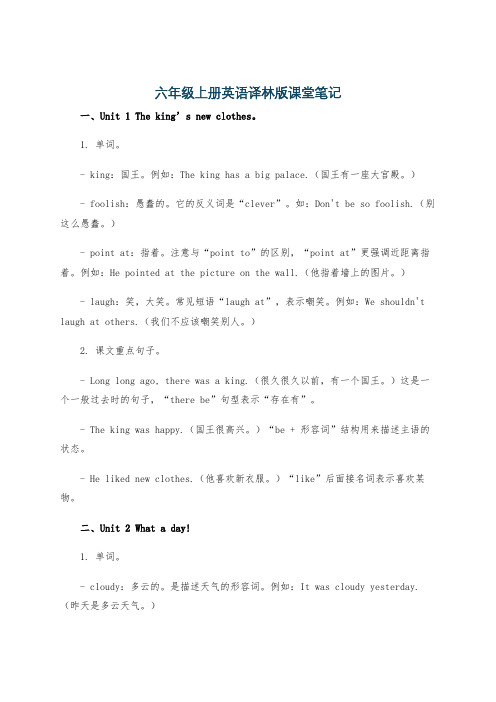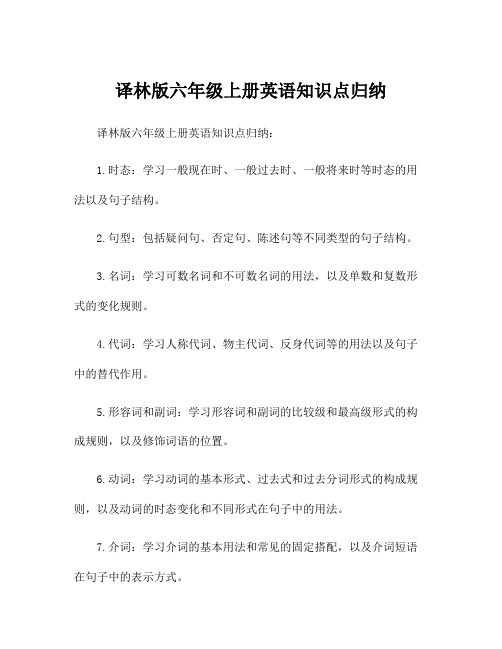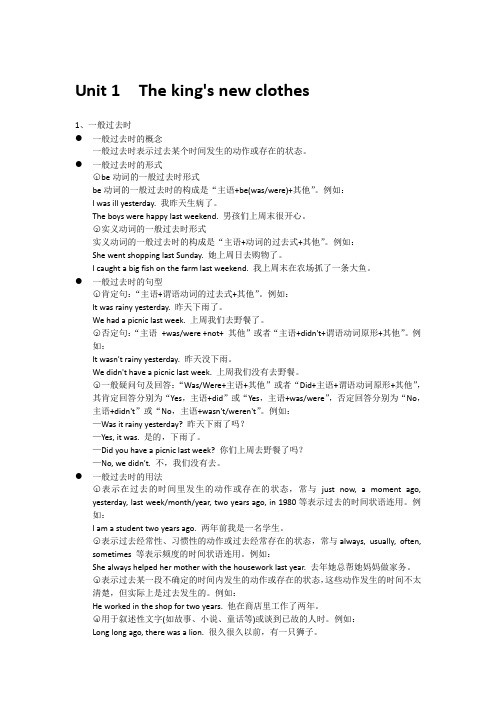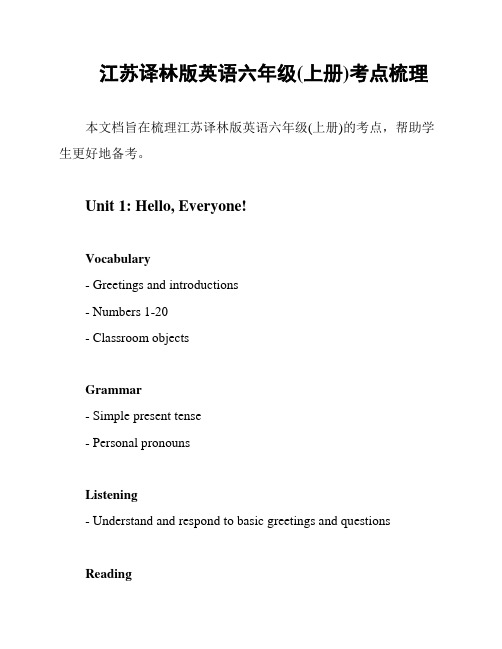译林版英语六年级上册知识点
六年级上册英语译林版课堂笔记

六年级上册英语译林版课堂笔记一、Unit 1 The king’s new clothes。
1. 单词。
- king:国王。
例如:The king has a big palace.(国王有一座大宫殿。
)- foolish:愚蠢的。
它的反义词是“clever”。
如:Don't be so foolish.(别这么愚蠢。
)- point at:指着。
注意与“point to”的区别,“point at”更强调近距离指着。
例如:He pointed at the picture on the wall.(他指着墙上的图片。
)- laugh:笑,大笑。
常见短语“laugh at”,表示嘲笑。
例如:We shouldn't laugh at others.(我们不应该嘲笑别人。
)2. 课文重点句子。
- Long long ago, there was a king.(很久很久以前,有一个国王。
)这是一个一般过去时的句子,“there be”句型表示“存在有”。
- The king was happy.(国王很高兴。
)“be + 形容词”结构用来描述主语的状态。
- He liked new clothes.(他喜欢新衣服。
)“like”后面接名词表示喜欢某物。
二、Unit 2 What a day!1. 单词。
- cloudy:多云的。
是描述天气的形容词。
例如:It was cloudy yesterday.(昨天是多云天气。
)- rainy:下雨的。
同样是天气类形容词,其名词形式是“rain”。
如:We can't go out on a rainy day.(下雨天我们不能出去。
)- show:展示;演出。
例如:She showed me her new book.(她给我看了她的新书。
)也可以说“a fashion show”(时装秀)。
- dumpling:饺子。
这是一个可数名词。
译林版六年级英语上册知识点汇总

Unit 1 The king's new clothes 重点单词magic有魔力的,神奇的through 穿过quick迅速的,快的laugh笑,大笑tell讲,叙述next下一个clever 聪明的each每个think想,思考wear 穿start 开始turn 机会foolish 愚蠢的sentence 句子hard 努力地,费劲地say说little小的,年幼的child 孩子重点词组long long ago 很久以前try on 试穿point at指向the next sentence 下一句each student 每个学生work hard 辛苦地劳动in his new clothes 穿着他的新衣have to start不得不开始turn into 变成walk through 步行穿过fit well 合身think hard 努力思考move away移走,搬走laugh at 嘲笑tell a story 讲个故事visit him 拜访他live behind two mountains 住在两座大山的背面children and grandchildren 子子孙孙重点句子1 Long long ago,there was a king.很久很久以前有一个国王。
2 There were a lot of people in the street.街上有许多人。
3 The king was happy.国王很开心。
4 The king liked new clothes.国王喜欢新衣服。
5 One day,two men visited the king.一天,两个人拜见了国王。
6 The king walked through the city in his new clothes.国王穿着他的新衣服穿过整个城市。
7 They looked at the king and shouted.他们看着国王并且大声叫喊。
译林版六年级上册英语知识点归纳

译林版六年级上册英语知识点归纳译林版六年级上册英语知识点归纳:1.时态:学习一般现在时、一般过去时、一般将来时等时态的用法以及句子结构。
2.句型:包括疑问句、否定句、陈述句等不同类型的句子结构。
3.名词:学习可数名词和不可数名词的用法,以及单数和复数形式的变化规则。
4.代词:学习人称代词、物主代词、反身代词等的用法以及句子中的替代作用。
5.形容词和副词:学习形容词和副词的比较级和最高级形式的构成规则,以及修饰词语的位置。
6.动词:学习动词的基本形式、过去式和过去分词形式的构成规则,以及动词的时态变化和不同形式在句子中的用法。
7.介词:学习介词的基本用法和常见的固定搭配,以及介词短语在句子中的表示方式。
8.冠词:学习"a"、"an"和"the"的用法和区别,以及冠词与其他词类的搭配。
9.数词:学习基数词、序数词和分数的表达方式及用法。
10.并列连词:学习并列连词的用法和表示方式,如"and"、"but"、"or"等。
11.程度副词:学习表示程度或强调的副词,如"very"、"too"、"so"等。
12.物体和物品:学习常见的物体和物品的名称,以及它们的形状、颜色、尺寸等特征描述。
13.动物、植物和自然界:学习不同种类的动物、植物和自然界的名称及特征描述。
14.基本日常生活用语:学习常见的日常用语,如问候、道谢、表达喜欢和不喜欢等。
15.时间、日期和季节:学习表示时间、日期和季节的词汇与句型。
16.地点和方位:学习表示地点和方位的词汇,如家、学校、街道、方向等。
17.格言和谚语:学习一些常见的格言和谚语,了解其中的含义和用法。
18.文化习俗和节日传统:学习不同国家或民族的文化习俗和节日传统,了解和欣赏多元文化。
以上是译林版六年级上册英语的知识点归纳,希望可以准确回答您的问题。
译林版(三起)六年级英语上册Unit8ChineseNewYear单元知识知识点复习

6上Unit8 单元知识知识点复习一、四会单词get 收到food食物2rich 富有的plan计划next week 下周二、词组1.Chinese New Year中国新年2.get an email from her e-friend得到一封来自她网友的邮件3.in Hong Kong在香港4.next week下周5.my family我的家人6.in the evening在晚上7.make some cakes and tangyuan买些蛋糕和汤圆8.on Chinese New Year’s Eve在除夕夜9.have dinner with my grandparents和我的祖父母一起吃晚饭10.my cou sin我的表妹11.on Chinese New Ye ar’s Day在大年初一12.gi ve me red packets给我红包13.watch a lion dance看舞狮表演14.on the second day of Chinese New Year在大年初二15.watch fireworks看烟花16.look for something good寻找一些好东西17.cook dumplings煮饺子18.after dinner晚饭后19.talk about their plans for Chinese New Year’s Day谈论中国新年的计划20.see Aunt Alice看爱丽丝阿姨21.What a nice cake!= How nice the cake is! 多漂亮的蛋糕啊!22.Happy Chinese New Year!春节快乐!23.what food什么食物24.be coming来了25.be going to打算做某事26.be excited兴奋的,激动的27.buy some new clothes 买些新衣服28.my aunt我的阿姨29. buy some flowers买些花30.my parents我的父母31.get red packets得到红包32.in the afternoon在下午33.at Chinese New Year在中国新年34.in the kitchen在厨房里35.be rich富有的36.say … to …对……说……37.what places什么地方38.the most important ho liday最重要的节日39.light some fireworks and firecrackers点烟花和鞭炮三、句型1. What are you going to do on Chinese New Year’s Eve?除夕夜你打算干什么?2. I’m/We’re going to make some cakes and tangyuan.我(们)打算做蛋糕和汤圆。
六年级英语译林上册知识点

六年级英语译林上册知识点六年级英语译林上册是小学六年级学生所学习的英语教材,本册教材内容丰富,包含了许多重要的英语知识点。
在这篇文章中,我们将详细介绍六年级英语译林上册的知识点,以帮助学生更好地理解和掌握这些内容。
一、语法知识点1.过去进行时过去进行时用来表示过去某个时间正在进行的动作或状态。
其结构为“was/were + 动词的现在分词”。
例如:I was reading a book when the phone rang.(当电话响起时,我正在读书。
)2.被动语态被动语态用来描述主语是动作的承受者而不是执行者的句子。
其结构为“be + 过去分词”。
例如:The book was written by Tom.(这本书是由汤姆写的。
)3.情态动词情态动词用来表示能力、允许、必须等情态。
例如:can, must, should等。
例如:You must finish your homework before playing computer games.(你必须在玩电脑游戏之前完成作业。
)二、词汇知识点1.短语动词短语动词包括动词加副词、介词短语或副词短语构成的短语。
例如:get up, give up, look after等。
例如:She always looks after her younger brother.(她总是照顾她的弟弟。
)2.固定短语固定短语是指一组词的组合具有固定的意义,不能随意变动。
例如:in front of, on the way to, at the end of等。
例如:The post office is in front of the library.(邮局在图书馆的前面。
)三、阅读理解知识点1.主旨大意题主旨大意题要求理解文章的主旨或中心思想。
学生需要综合考虑文章的标题、段落信息和文章细节来确定主旨。
例如:What is the main idea of the passage?(这篇文章的主要观点是什么?)2.细节理解题细节理解题要求从文章中找到特定的信息或细节。
译林版六年级英语上册知识点

Unit 1 The king’s new clothes一,单词/词组1. long long ago 很久以前 2. new clothes 新衣服3. make new clothes for you 为你制作新衣服 make sth for sb4. show the king his new clothes给皇帝展示新衣服show sb. sth.= show sth. to sb.5. try on 试穿try on the coat=try the coat on try it/them on6. magic clothes 有魔力的衣服7. walk through步行穿过 8. in his new clothes 穿着他的新衣服9. shout at sb. 对某人大叫10. laugh at sb. 对某人大笑11. look at 看….12. point at 指向…13. fit well 非常适合14. an American cowboy 一个美国牛仔15. a Scottish man 一位苏格兰人 16. tell a story 讲一个故事17. say a/one sentence 说一句话 18. on the mountain 在山上19. the next sentence 下一句话20. live in the house 住在房子里21. tell the boy a story 给这个男孩讲一个故事 tell sb. sth.22. it is one's turn 某人的机会 23. think hard 努力思考24. have to 不得不 have to do sth.25. in front of 在….前面(外部) in the front of 在… 前面(内部)26. walk by 路过27. be nice to sb. 对某人好28. look after 照顾29. turn into 变成二,句型1. Long long ago, there was a king. 很久很久以前,有一位国王。
新译林版六年级上册英语知识点归纳总结

Unit 1 The king's new clothes1、一般过去时●一般过去时的概念一般过去时表示过去某个时间发生的动作或存在的状态。
●一般过去时的形式○1be动词的一般过去时形式be动词的一般过去时的构成是“主语+be(was/were)+其他”。
例如:I was ill yesterday. 我昨天生病了。
The boys were happy last weekend. 男孩们上周末很开心。
○2实义动词的一般过去时形式实义动词的一般过去时的构成是“主语+动词的过去式+其他”。
例如:She went shopping last Sunday. 她上周日去购物了。
I caught a big fish on the farm last weekend. 我上周末在农场抓了一条大鱼。
●一般过去时的句型○1肯定句:“主语+谓语动词的过去式+其他”。
例如:It was rainy yesterday. 昨天下雨了。
We had a picnic last week. 上周我们去野餐了。
○2否定句:“主语+was/were +not+ 其他”或者“主语+didn't+谓语动词原形+其他”。
例如:It wasn't rainy yesterday. 昨天没下雨。
We didn't have a picnic last week. 上周我们没有去野餐。
○3一般疑问句及回答:“Was/Were+主语+其他”或者“Did+主语+谓语动词原形+其他”,其肯定回答分别为“Yes,主语+did”或“Yes,主语+was/were”,否定回答分别为“No,主语+didn't”或“No,主语+wasn't/weren't”。
例如:—Was it rainy yesterday? 昨天下雨了吗?—Yes, it was. 是的,下雨了。
—Did you have a picnic last week? 你们上周去野餐了吗?—No, we didn't. 不,我们没有去。
江苏译林版英语六年级(上册)考点梳理

江苏译林版英语六年级(上册)考点梳理本文档旨在梳理江苏译林版英语六年级(上册)的考点,帮助学生更好地备考。
Unit 1: Hello, Everyone!Vocabulary- Greetings and introductions- Numbers 1-20- Classroom objectsGrammar- Simple present tense- Personal pronounsListening- Understand and respond to basic greetings and questionsReading- Read and understand simple sentences and short paragraphsWriting- Write simple sentences to introduce oneself and ask basic questionsUnit 2: My School DayVocabulary- School subjects- School activities and facilities- Time expressionsGrammar- Present continuous tense- Adverbs of frequencyListening- Understand and follow classroom instructions and schedulesReadingWriting- Write sentences and short paragraphs to describe daily activities Unit 3: Family FunVocabulary- Family members- Hobbies and activitiesGrammar- Simple past tense- Adjectives to describe people and activitiesListening- Understand and respond to questions about family and hobbies Reading- Read and understand short passages about family members and hobbiesWriting- Write sentences to describe family members and talk about hobbies...(继续按照此格式对各单元进行考点梳理)总结本文档对江苏译林版英语六年级(上册)的各单元的考点进行了梳理,包括词汇、语法、听力、阅读和写作等方面。
- 1、下载文档前请自行甄别文档内容的完整性,平台不提供额外的编辑、内容补充、找答案等附加服务。
- 2、"仅部分预览"的文档,不可在线预览部分如存在完整性等问题,可反馈申请退款(可完整预览的文档不适用该条件!)。
- 3、如文档侵犯您的权益,请联系客服反馈,我们会尽快为您处理(人工客服工作时间:9:00-18:30)。
译林版英语六年级上册知识点音乐是幸福人生的兴奋剂,舞蹈是美满人生的强心针。
书本是创造人生财富的精神食粮,知识就是力量是无形财富是良师益友。
下面小编给大家分享一些译林版英语六年级上册知识点,希望能够帮助大家,欢迎阅读!译林版英语六年级上册知识1一,单词/词组1.long long ago 很久以前2. new clothes 新衣服3.make new clothes for you 为你制作新衣服 make sth for sb4.show the king his new clothes给皇帝展示新衣服show sb. sth.= show sth. to sb.5. tryon 试穿 try onthe coat=try the coat ontry it/them on6.magic clothes 有魔力的衣服7.walk through步行穿过8. in his new clothes 穿着他的新衣服9.shout at sb. 对某人大叫10. laugh at sb. 对某人大笑11.look at 看….12.point at 指向…13.fit well 非常适合14. an American cowboy 一个美国牛仔15. aScottish man 一位苏格兰人16. tell a story 讲一个故事17.say a/one sentence 说一句话18. on the mountain 在山上19.the next sentence 下一句话20. live in the house 住在房子里21.tell the boy a story 给这个男孩讲一个故事 tell sb. sth.22. itis one’s turn 某人的机会23. think hard 努力思考24.have to 不得不 have to do sth.25. infront of 在….前面(外部) in the front of 在… 前面(内部)26.walk by 路过27. be nice to sb. 对某人好28.look after 照顾29. turn into 变成二,句型1. Longlong ago, there was a king. 很久很久以前,有一位国王。
2. Theking was happy. 国王很开心。
3. He liked new clothes. 他喜欢新衣服。
4. Twomen visited the king. 两个男人拜访了这位国王。
译林版英语六年级上册知识2一,单词/词组What aday! 糟糕的一天;忙碌的一天;累人的一天等等(表达的含义很多,根据具体语境来看)这里指“糟糕的一天”1. the 19th of September 在九月十九号2. asunny/ windy / rainy day 晴朗的/ 刮风/下雨的一天3. alot of rain 许多雨(不可数)4. alot of snow 许多雪(不可数)5.see/ watch a parrot show 观看一场鹦鹉表演6. seesome interesting parrots看见一些有趣的鹦鹉7. aninteresting film 一部精彩的电影8.become windy and cloudy变成大风和阴天(多云)9. flykites high in the sky风筝放得高10.bring some dumplings带来一些饺子11. bring lunch 带午餐12.some bread and honey 一些面包和蜂蜜13. some drinks 一些饮料14. hungry and thirsty 又饿又渴15. wet clothes 潮湿的衣服16.have/ eat our lunch吃我们的午饭17. black clouds乌云18.meet me/ him/ her/ them/ you 遇见我/他/ 她/ 他们/ 你19.look sad/ happy 看起来很伤心/ 开心20.this morning/ afternoon/ evening 今天早晨/ 下午/ 晚上21.climb up the hill 爬上山22. get up at seven 七点起床23. goto school by bike 骑自行车去上学24. have a picnic野餐25.watch a film看电影26. in the sky在空中27. all day 一整天28. goaway 走了29. lose my kite丢了我的风筝30.want to know why想要知道为什么31. what happened出了什么事32.fly too high飞得太高33. find it 找到它34. near the hill 在小山附近35. inyour diary 在你的日记里词组(三会)1.hold onto it抓紧它2. fly away飞走了3.find it near the hill在山的附近找到它4. in your diary在你的日记里5.cheer together一起欢呼二、句型:1、今天的天气怎么样?是晴朗的。
A:How’sthe weather today? B: It’s sunny. The weather is sunny.2、昨天的天气怎么样?是下雨的。
A;What was the weather like yesterday?B : Itwas rainy. The weather was rainy.3、我看见一些有趣的鹦鹉。
We sawsome interesting parrots.4、我们上周日放风筝了。
We flew kites last Sunday.5、昨天他带来了一些饮料,面包和蜂蜜。
Hebrought some drinks, bread and honey yesterday.6、两天前她带来了一些水饺。
She brought somedumplings two days ago.7、昨天下雨了。
It rained yesterday.8、 Why do you have it?你怎么会拿到它的?三、语法1、过去时态:本课出现的动词不规则变化(同学们要反复朗读)give-gave lose- lost become- became hold- heldcome-came bring- brought buy- brought see- sawwrite-wrote can- could find- found meet- metfly-flew2、rainy - 下雨的(形容词)3、snowy- 下雪的(形容词)rain snow(1)名词:雨(不可数): a lot of rain (1)名词:雪(不可数): a lot of snow(2)动词:下雨 (2)动词:下雪例句:a) Itrained yesterday. 昨天下雨了。
b)Look! It is raining now! 看!现在正在下雨。
c) Itoften rains here. 这儿经常下雨。
d) It’s often rainy.经常下雨了。
3. bybike 骑自行车和 ride a bike 骑自行车的区别:bybike 属于副词短语,指的是交通方式,比如说别人问,你一般上学用什么交通工具,你回答“I go to school by bike”,而ride a bike 属于动词短语,指的是动作,别人问你说,你在干吗?你说:“I am riding a bike”(正在骑车)而不能说Iam by bike,因为by bike 是指交通方式。
译林版英语六年级上册知识3一,单词、词组1. come back to school 返校2. the National Day holiday 国庆节假期3. call you 打电话给你4. visit my aunt拜访我的婶婶5. Shanghai Museum上海博物馆6. see many interesting things看见很多有趣的东西7. go to a farm 去农场8. near Star Lake 在星湖附近9. pick some oranges摘一些橙子10. go fishing去钓鱼11. catch a big fish抓到一条大鱼12. Tian’anmen Square天安门广场13. Palace Museum故宫博物院14. Summer Palace 颐和园15. the Great Wall长城16. pick an orange for me为我摘一个橙子17. main school holidays学校主要的假期18. the Easter holiday复活节假期19. the summer holiday暑假20. the Christmas holiday圣诞节假期21. come home late晚回家22. have a fashion show有一场时装秀23. love beautiful clothes爱漂亮的衣服24. be excited about the show 对秀感到激动25 wear paper clothes 穿纸衣服26. wear a lot of bottles穿很多瓶子27. ask about the show询问关于秀的事28. go well进展顺利29. at first在开始的时候30. heavy rain大雨31. the Car Museum轿车博物馆32. visit his cousin拜访他的表兄33. have a birthday party举行一个生日聚会34. catch a fish for me为我抓一条鱼二,动词过去式catch---caught eat---ate get---got meet---met lose---lost hold---held find---found三.重点句型:1. What did you do for theholiday?2. How was your holiday? It wasgreat fun.3. Why did you call me?Because I wanted to give the fish to you.4. What great fun!5. It is time for dinner.拓展:1. excited / exciting I’m excited at the exciting running race.译林版英语六年级上册知识4一,单词、词组1.then and now过去和现在2. sixyears ago六年前3. domany things做很多事4.write letters to his friends = write to his friends写信给他的朋友5. inthe office在办公室里6. usethe telephone使用电话7.call people打电话给人们8. amobile phone一部手机9.call people anywhere随处打电话给人们10.write/send an email写/发一封电子邮件11.listen to the radio听收音机12.watch news on the Internet在网上看新闻13.read e-books看电子书14.make friends with sb. 与某人交朋友15.e-friends from all over the world来自世界各地的网友16. doshopping = do the shopping = do some shopping = go shopping购物17.work hard努力工作18.invent the aeroplane发明飞机19. anAmerican man一位美国男士20. aBritish girl一个英国女孩21.have an English lesson上一节英语课22.look out of the window朝窗外看23.listen to me听我说24. goon继续25.spell the new words拼写新单词26.get angry = be angry生气的27.make a sentence with …用…来造句28.wait for the answer等待答案29. aphoto of yourself一张你自己的照片30.just now刚才31. amoment ago一会儿以前32.read newspapers for news看报纸上的新闻33.buy things from shops从商店买东西e …to… 用…做…35.readand draw 读和画36.doshopping on the Internet 在网上购物37.surfthe Internet 网上冲浪38.buyme a mobile phone/buy a mobile for me 给我买手机ethe phone to call you 用电话打给你38.likemaking friends 喜欢交朋友。
